Wednesday, August 21, 2019
(August 21, 2019) — Four years ago, after having operated a propane company for some 35 years, Alan Friedman went back to school. He had been running the company since around 1980, when he was just 16 years old and still in high school. Despite having to learn everything on the job, he was accepted to the Harvard Business School Owner/President Management (OPM) program in 2015.
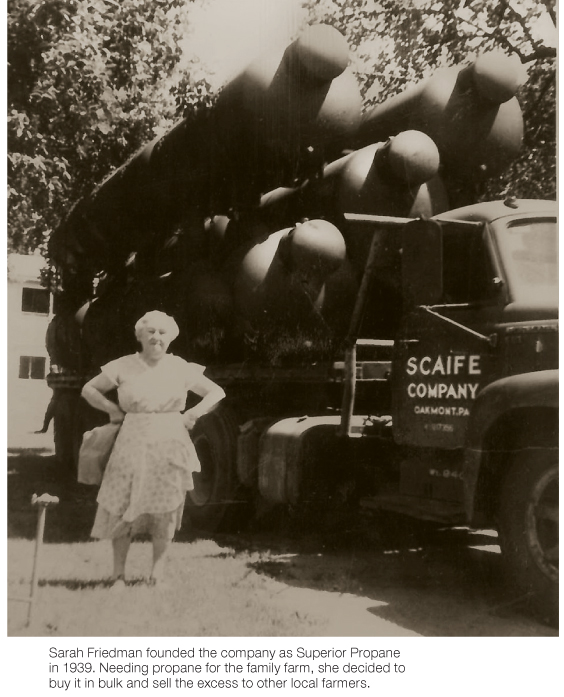
“I needed to reinvent myself and the company in a changing world,” Friedman says. “I wasn’t tech-savvy and I felt I had to do something to take the company in a new direction and keep it going. The world was changing; I had been running the company for 30-plus years and I had to adapt to keep up with the changes.”
He and his company, Superior Energy LLC (Vernon, Conn.), have indeed kept up. When Friedman took over, the company had four employees; today it has 12—many who have worked for Superior their whole lives, offering a combined experience of more than 150 years.
The company now delivers propane to a wider area and sells, installs, and services a wider selection of appliances. From one office, Superior Energy works with customers in Connecticut, Massachusetts, and Rhode Island. Its licensed service technicians can handle everything from small cooking appliances to 30,000-gal. tanks. The company services both residential and commercial customers. As this was written, the company had 201 reviews and a 5.0-star rating on Google; 81 reviews and a 5.0 rating on Facebook; and an A+ rating at the Better Business Bureau.
“We’re full service and high quality,” Friedman says. To achieve those kinds of customer ratings and business growth, Friedman has made changes along the way.
80 YEARS, MANY CHANGES
He is the fourth person to lead the family-owned and -operated business. The company was founded in 1939 by his grandmother, Sarah Friedman. Sarah, her husband Max, along with six kids (youngest son Harry was born later) immigrated to the U.S. from Europe to work as farmers. She spoke little English but knew a business opportunity when she saw one. Needing propane for the family farm, she decided to buy the propane in bulk and sell the excess to other local farmers. Thus, the company was founded as Superior Propane Inc. in Ellington, Conn.
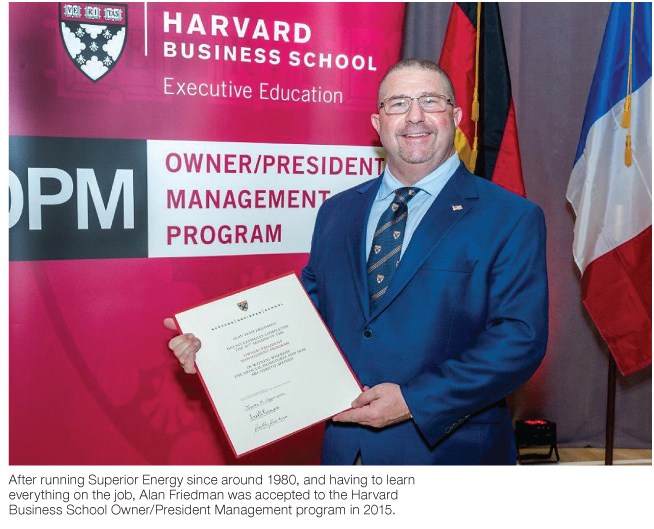
“The closest place to buy propane was Springfield, Mass.,” Alan Friedman explains. “Today it might take 30 or 40 minutes to get there, but then, with no highway and with 1930s trucks, it took an hour and a half or two hours. So, she started buying propane and selling it to people across the street. That would save them having to drive to Springfield. The area was all chicken farms; there were maybe eight to 12 farms within a mile. Those were her customers. She was a woman ahead of her time, a real powerhouse. Especially as an immigrant, and mother of seven, she was really the first in our family to not fear change, or a challenge.”
Sarah’s son Izzy took over and ran the company until around 1948. Izzy was a U.S. army veteran and electrician, so for a time the company was called Superior Gas & Electric. Then Sarah’s youngest son—Alan’s father, Harry—ran the company from the 1950s, after returning home from serving as a Marine in the Korean War, to 1980.
“My father brought in the first bulk trucks,” Alan Friedman says. “It was a slow transition. My grandmother only sold bottles. When I took over in 1980, it was still only 30% to 40% bulk.”
Harry Friedman grew the company and was the first to add staff. By 1980, the company had grown to four employees.
“Starting in the 1950s, the economy grew, the area grew, and the company grew along with it,” Alan Friedman says. “The farms turned into subdivisions. There were a growing number of restaurants and other businesses that used propane. My dad grew the company by getting restaurants as customers; he was on the road all the time. At the time, the subdivisions weren’t using propane. The builders’ mentality was that if they couldn’t get natural gas, they would use heating oil. It took a long time for them to consider propane.”
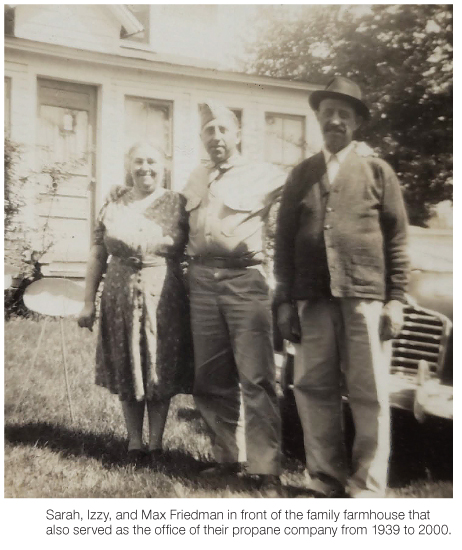 That was the case up until the late 1990s. Then, propane began replacing fueloil. Superior Energy put in its first all-propane subdivision around 2000.
That was the case up until the late 1990s. Then, propane began replacing fueloil. Superior Energy put in its first all-propane subdivision around 2000.
“That’s when we had our first big break,” Friedman says. “A builder called me just for the price of gas logs and some gas stoves. I asked how he was going to heat the homes; he said oil. I asked, ‘Why not propane?’ He said he had never thought of it. He tried a couple of houses and then went all propane. Once there was a tank in the yard, he used propane for everything.”
A NEW GENERATION
Alan can’t remember his age when he began working at the company. He does know that he was driving service trucks and bobtails at the age of 14. “It was farm country and the 1970s, so things were a lot laxer in those days.” After his mother passed away from cancer in 1980, his father came to the office only rarely. It was up to a teenage Alan to pay the bills and keep the family income and business going.
“I was already doing the mechanics of the business—the tanks, the trucks, delivery—so then I had to learn how to run a business,” Friedman says. “I learned by trial and error.”
Just to be able to keep up with both work and school, he slept most nights at the old family farmhouse in Ellington that served as the original Superior office. He has been running the business since then. (They moved to their modern office and showroom in Vernon in 2000—no overnight beds in sight.)
One of the first things Alan did as owner was to replace the existing crew who had a hard time taking direction from “the boss’s” teenage son. Many of the people he hired to replace that crew are still with the company more than 30 years later. “They have aged and grown with me. We are like family and I trust them implicitly.” Friedman spends a good deal of money on training every year and brings trainers to the office. “Your most important asset is your people,” he says. “You should pay them well, treat them well, and empower them. If your people are happy, they will take care of your customers and stick by you and the company.”
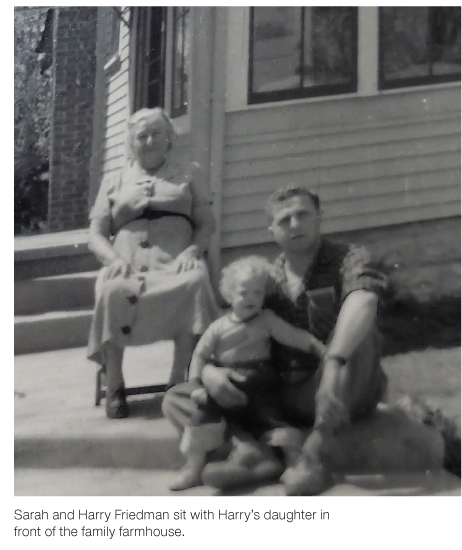
LEARNING TO ADAPT AND NOT FEAR CHANGE
In 2015, Friedman entered the three-year Harvard Business School OPM program. Going back to school at that age was difficult. The other students were in their 30s and more tech-savvy. The schedule was challenging too: study group at 7:30 a.m., class from 9 to noon, class again from 1 p.m. to 4, and study group again from 6 to 9. That was the schedule for six days a week, and it doesn’t include the time for the required reading. The students had to live on campus three weeks a year and then implement what they learned at the office and show the professors their progress. “I would call my wife and say, ‘Why am I doing this? I’m paying to go through this.’ But in the end it was worth it.”
The changes recommended at Harvard, and adopted at Superior Energy, included the hiring of remote workers to handle their online presence, and the formation of an advisory board. These have helped Friedman adapt to the many changes he has seen in the propane business over the last 40 years.
Among those changes is the need to adapt to the internet. Today, Superior Energy is fully digitized. All deliveries are digitized, including the routing, tickets, and filing. Customers can order online and can chat with the company online. Even if a customer contacts Superior on a Sunday afternoon, the company will get back to them quickly. Customer service is their main priority always.
The company confirms service appointments by texting customers and asking them to confirm the appointment or reschedule. “That’s what the younger generation wants,” Friedman says. “They want a text or email, not a phone call. But, even with that, we still remain true to our small, local business roots and those customers who have been with us for decades—some as long as 40 years. They appreciate that when they do call, they always speak with a live person, likely the same person who first set them up on their account!”
At the same time, on appliance sales, Superior has had to face new competitors like Amazon. Today, consumers can buy appliances online for the same price businesses like Superior buy them for. “We can’t change that, so we need to work with those changes,” Friedman says. They instead emphasize the ease and savings of not having to pay expensive shipping rates—which always carry with them the potential that something will arrive broken, leading to the hassle if it needs to be returned, etc. Superior, therefore, offers its customers a warranty on all the products it sells and offers professional delivery and installation. Most people like the idea of saving time and getting the quality guarantee that comes along with it.
 Another change is that it’s harder to hire and retain blue-collar workers. “That’s a change in our country, not just our industry,” Friedman says. “The blue-collar workforce is aging. What kid wants to be a plumber or an electrician? They want to be a millionaire, without knowing how they’re going to get there or wanting to put in much effort.”
Another change is that it’s harder to hire and retain blue-collar workers. “That’s a change in our country, not just our industry,” Friedman says. “The blue-collar workforce is aging. What kid wants to be a plumber or an electrician? They want to be a millionaire, without knowing how they’re going to get there or wanting to put in much effort.”
Friedman says he expects this problem to get worse as current workers retire and as the government makes it more difficult to get a commercial driver’s license. “I’ve been very lucky,” he says. “People come to us. My crew has been here so long, and they speak so highly of the company, that people seek us out. You have to not just hire people, but retain the good crew you have. I reward my crew and I am lenient when it comes to taking time off for family matters. A company has to keep employees happy, keep customers happy, and make money. You can’t just do two out of three; you have to do all three.”
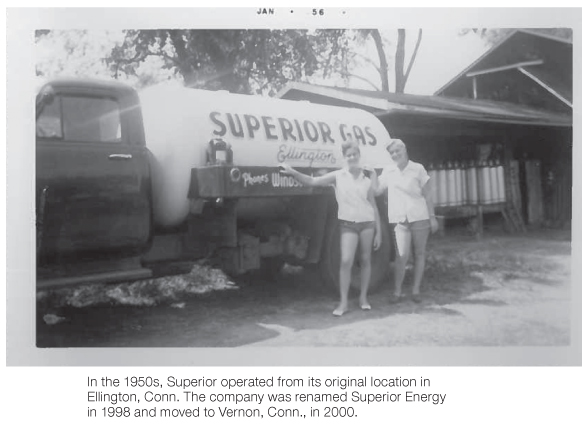
A change unique to New England is the large-scale conversion from fueloil to propane or natural gas. Friedman added boiler swap-outs to his range of services about 10 years ago. At the same time, he has had to adapt to competition from companies from the oil business who have moved into propane. “Fifteen years ago, I had 10 competitors; now, I probably have 100.”
“You have to continue to reinvent yourself and your company,” Friedman adds. “You have to learn and learn. It doesn’t have to be Harvard, it can be any college or reading, but you have to learn to adapt and not fear change. Then there is the hardest part: the implementation and follow-through. If you fail, fail fast, and then try again. And always, always remember that you cannot accomplish anything without your support staff and the people you surround yourself with. Show them that you value and appreciate their input and all they do to make your business a success.” — Steve Relyea

“I needed to reinvent myself and the company in a changing world,” Friedman says. “I wasn’t tech-savvy and I felt I had to do something to take the company in a new direction and keep it going. The world was changing; I had been running the company for 30-plus years and I had to adapt to keep up with the changes.”
He and his company, Superior Energy LLC (Vernon, Conn.), have indeed kept up. When Friedman took over, the company had four employees; today it has 12—many who have worked for Superior their whole lives, offering a combined experience of more than 150 years.
The company now delivers propane to a wider area and sells, installs, and services a wider selection of appliances. From one office, Superior Energy works with customers in Connecticut, Massachusetts, and Rhode Island. Its licensed service technicians can handle everything from small cooking appliances to 30,000-gal. tanks. The company services both residential and commercial customers. As this was written, the company had 201 reviews and a 5.0-star rating on Google; 81 reviews and a 5.0 rating on Facebook; and an A+ rating at the Better Business Bureau.
“We’re full service and high quality,” Friedman says. To achieve those kinds of customer ratings and business growth, Friedman has made changes along the way.
80 YEARS, MANY CHANGES
He is the fourth person to lead the family-owned and -operated business. The company was founded in 1939 by his grandmother, Sarah Friedman. Sarah, her husband Max, along with six kids (youngest son Harry was born later) immigrated to the U.S. from Europe to work as farmers. She spoke little English but knew a business opportunity when she saw one. Needing propane for the family farm, she decided to buy the propane in bulk and sell the excess to other local farmers. Thus, the company was founded as Superior Propane Inc. in Ellington, Conn.

“The closest place to buy propane was Springfield, Mass.,” Alan Friedman explains. “Today it might take 30 or 40 minutes to get there, but then, with no highway and with 1930s trucks, it took an hour and a half or two hours. So, she started buying propane and selling it to people across the street. That would save them having to drive to Springfield. The area was all chicken farms; there were maybe eight to 12 farms within a mile. Those were her customers. She was a woman ahead of her time, a real powerhouse. Especially as an immigrant, and mother of seven, she was really the first in our family to not fear change, or a challenge.”
Sarah’s son Izzy took over and ran the company until around 1948. Izzy was a U.S. army veteran and electrician, so for a time the company was called Superior Gas & Electric. Then Sarah’s youngest son—Alan’s father, Harry—ran the company from the 1950s, after returning home from serving as a Marine in the Korean War, to 1980.
“My father brought in the first bulk trucks,” Alan Friedman says. “It was a slow transition. My grandmother only sold bottles. When I took over in 1980, it was still only 30% to 40% bulk.”
Harry Friedman grew the company and was the first to add staff. By 1980, the company had grown to four employees.
“Starting in the 1950s, the economy grew, the area grew, and the company grew along with it,” Alan Friedman says. “The farms turned into subdivisions. There were a growing number of restaurants and other businesses that used propane. My dad grew the company by getting restaurants as customers; he was on the road all the time. At the time, the subdivisions weren’t using propane. The builders’ mentality was that if they couldn’t get natural gas, they would use heating oil. It took a long time for them to consider propane.”
 That was the case up until the late 1990s. Then, propane began replacing fueloil. Superior Energy put in its first all-propane subdivision around 2000.
That was the case up until the late 1990s. Then, propane began replacing fueloil. Superior Energy put in its first all-propane subdivision around 2000.“That’s when we had our first big break,” Friedman says. “A builder called me just for the price of gas logs and some gas stoves. I asked how he was going to heat the homes; he said oil. I asked, ‘Why not propane?’ He said he had never thought of it. He tried a couple of houses and then went all propane. Once there was a tank in the yard, he used propane for everything.”
A NEW GENERATION
Alan can’t remember his age when he began working at the company. He does know that he was driving service trucks and bobtails at the age of 14. “It was farm country and the 1970s, so things were a lot laxer in those days.” After his mother passed away from cancer in 1980, his father came to the office only rarely. It was up to a teenage Alan to pay the bills and keep the family income and business going.
“I was already doing the mechanics of the business—the tanks, the trucks, delivery—so then I had to learn how to run a business,” Friedman says. “I learned by trial and error.”
Just to be able to keep up with both work and school, he slept most nights at the old family farmhouse in Ellington that served as the original Superior office. He has been running the business since then. (They moved to their modern office and showroom in Vernon in 2000—no overnight beds in sight.)
One of the first things Alan did as owner was to replace the existing crew who had a hard time taking direction from “the boss’s” teenage son. Many of the people he hired to replace that crew are still with the company more than 30 years later. “They have aged and grown with me. We are like family and I trust them implicitly.” Friedman spends a good deal of money on training every year and brings trainers to the office. “Your most important asset is your people,” he says. “You should pay them well, treat them well, and empower them. If your people are happy, they will take care of your customers and stick by you and the company.”

LEARNING TO ADAPT AND NOT FEAR CHANGE
In 2015, Friedman entered the three-year Harvard Business School OPM program. Going back to school at that age was difficult. The other students were in their 30s and more tech-savvy. The schedule was challenging too: study group at 7:30 a.m., class from 9 to noon, class again from 1 p.m. to 4, and study group again from 6 to 9. That was the schedule for six days a week, and it doesn’t include the time for the required reading. The students had to live on campus three weeks a year and then implement what they learned at the office and show the professors their progress. “I would call my wife and say, ‘Why am I doing this? I’m paying to go through this.’ But in the end it was worth it.”
The changes recommended at Harvard, and adopted at Superior Energy, included the hiring of remote workers to handle their online presence, and the formation of an advisory board. These have helped Friedman adapt to the many changes he has seen in the propane business over the last 40 years.
Among those changes is the need to adapt to the internet. Today, Superior Energy is fully digitized. All deliveries are digitized, including the routing, tickets, and filing. Customers can order online and can chat with the company online. Even if a customer contacts Superior on a Sunday afternoon, the company will get back to them quickly. Customer service is their main priority always.
The company confirms service appointments by texting customers and asking them to confirm the appointment or reschedule. “That’s what the younger generation wants,” Friedman says. “They want a text or email, not a phone call. But, even with that, we still remain true to our small, local business roots and those customers who have been with us for decades—some as long as 40 years. They appreciate that when they do call, they always speak with a live person, likely the same person who first set them up on their account!”
At the same time, on appliance sales, Superior has had to face new competitors like Amazon. Today, consumers can buy appliances online for the same price businesses like Superior buy them for. “We can’t change that, so we need to work with those changes,” Friedman says. They instead emphasize the ease and savings of not having to pay expensive shipping rates—which always carry with them the potential that something will arrive broken, leading to the hassle if it needs to be returned, etc. Superior, therefore, offers its customers a warranty on all the products it sells and offers professional delivery and installation. Most people like the idea of saving time and getting the quality guarantee that comes along with it.
 Another change is that it’s harder to hire and retain blue-collar workers. “That’s a change in our country, not just our industry,” Friedman says. “The blue-collar workforce is aging. What kid wants to be a plumber or an electrician? They want to be a millionaire, without knowing how they’re going to get there or wanting to put in much effort.”
Another change is that it’s harder to hire and retain blue-collar workers. “That’s a change in our country, not just our industry,” Friedman says. “The blue-collar workforce is aging. What kid wants to be a plumber or an electrician? They want to be a millionaire, without knowing how they’re going to get there or wanting to put in much effort.” Friedman says he expects this problem to get worse as current workers retire and as the government makes it more difficult to get a commercial driver’s license. “I’ve been very lucky,” he says. “People come to us. My crew has been here so long, and they speak so highly of the company, that people seek us out. You have to not just hire people, but retain the good crew you have. I reward my crew and I am lenient when it comes to taking time off for family matters. A company has to keep employees happy, keep customers happy, and make money. You can’t just do two out of three; you have to do all three.”

A change unique to New England is the large-scale conversion from fueloil to propane or natural gas. Friedman added boiler swap-outs to his range of services about 10 years ago. At the same time, he has had to adapt to competition from companies from the oil business who have moved into propane. “Fifteen years ago, I had 10 competitors; now, I probably have 100.”
“You have to continue to reinvent yourself and your company,” Friedman adds. “You have to learn and learn. It doesn’t have to be Harvard, it can be any college or reading, but you have to learn to adapt and not fear change. Then there is the hardest part: the implementation and follow-through. If you fail, fail fast, and then try again. And always, always remember that you cannot accomplish anything without your support staff and the people you surround yourself with. Show them that you value and appreciate their input and all they do to make your business a success.” — Steve Relyea

